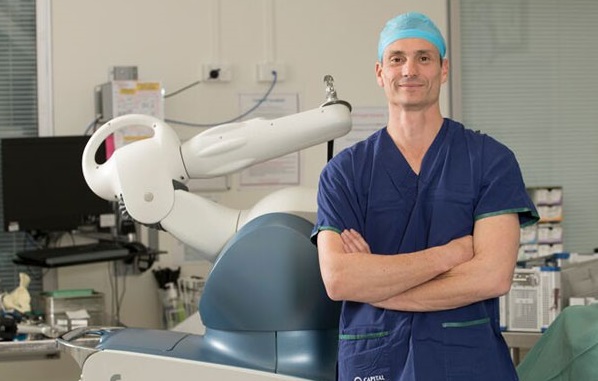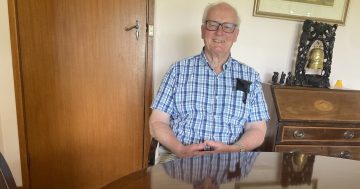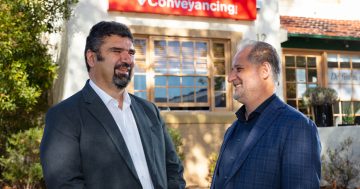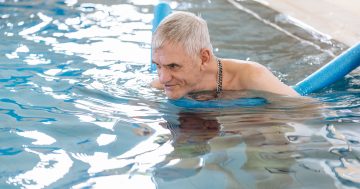
in.motion orthopaedic surgeon Dr Damian Smith, one of Canberra’s most recommended orthopaedic surgeons. Photo: in.motion.
With over 200 bones within the human body, orthopaedics as a speciality sure is in-demand. Orthopaedics is medical discipline that deals with treating the musculoskeletal system. This includes the muscles, bones, ligaments, and joints that all function cohesively to keep us in motion.
Orthopaedics are crucial when it comes to managing joint, muscular or bone pain which most of us will experience throughout our lifetimes. Management can include medication, casting, exercises, and in some cases surgery – followed by rehabilitation.
Navigating the field of orthopaedics is as vast as the number of bones in our bodies. Due to the sheer breadth of the profession, orthopaedic surgeons often work in areas of sub-speciality.
Sub-specialist care is often the best way to approach the rehabilitation of musculoskeletal disease or injury. Their wealth of knowledge and expertise is particularly beneficial for high-risk cases, and essential when the need for surgery arises.
With twelve hospitals in Canberra many of us may be unsure where to find the right orthopaedic surgeon. Some may have concerns around expertise or bedside manner. Others may be apprehensive of eagerness to operate.
The key is of course is finding the right orthopaedic surgeon. Once you have met your match your orthopaedic surgeon can work quickly to get mobility back on track.
What makes a great orthopaedic surgeon?
Great orthopaedic surgeons demonstrate exemplary professional leadership backed by years of formal education and extensive infield expertise. The best orthopaedic surgeons offer more than a list of qualifications; they are personable and value the provision of quality care. To help you on your search here are some things to keep in mind when looking for an orthopaedic surgeon in Canberra:
- Qualifications. Given the vastness of the orthopaedic area many surgeons sub-specialise treating a specific area of the body. Regardless of the area of specialisation your orthopaedic surgeon should have completed a medical degree, internship, and residency. Additionally, they should have acquired membership of the appropriate professional college.
- Top Notch Training. Beyond all necessary foundational qualifications look for an orthopaedist who has completed a fellowship in a sub-speciality related to your condition. A fellowship is a period of vocational training typically 5-6 years in length focused on the orthopaedic specialisation. In Australia, fellowships can be completed at the Royal Australasian College of Surgeons (FRANCS) or at the Australian Orthopaedic Association (FeOrthA). Many surgeons will have completed at least one or two fellowships during their time, positioning them amongst the most qualified in their field.
- Extracurricular Credentials. If you are looking for medical leadership, then consider orthopaedic surgeons who go the extra mile with additional professional activities. Surgeons with extracurricular credentials on industry boards and associations are often the most trusted and respected in their field. Additionally, those who are vested in the development of others be it through education or training demonstrate excellence above the rest.
- Connection and Comfort. If you find orthopaedic surgeons with equal credentials and experience, your decision may rest on the provider with whom you feel most at ease. During your consultation consider their manner, willingness to listen, and approachability. Finding an orthopaedic surgeon who shares your values will help to foster a trusting and collaborative relationship. Thus, your connection and degree of comfort will go a long way to ensuring you feel – and heal better.
- Post-Operative Care. The best orthopaedic surgeons will have well laid post-operative care plans that are executed with ease. Effective post-operative care not only minimises the risk of complications, it also assists with pain management and a healthy recovery. As such, look for orthopaedic surgeons who are readily accessible post-operation, and those who collaborate with other health providers for specialist care thereafter.
The best orthopaedic surgeons in Canberra
RiotACT’s editorial team has combed through 20 years of on-site comments to compile a list of the most recommended businesses according to you.
To be listed in our Best of Canberra series, each business needs to have consistently received positive feedback on RiotACT and Facebook as well as maintaining a minimum average of 4/5 stars on Google.
Damiani Orthopaedics
Well renowned within the medical community, Dr Maurizio Damiani provides comprehensive surgical management of orthopaedic conditions of the upper limb. Specialisations include hand, wrist, elbow, and shoulder concerns along with sports injury or trauma.
As a board director of the Australian Orthopaedic Association and clinical lecturer at the ANU Medical School, Dr Damiani also carries prestigious national and international qualifications.
Expertise aside, Dr Damiani conveniently practises across numerous Canberra locations. For comprehensive diagnosis, treatment, and rehabilitation look to Damiani Orthopaedics.
Rakesh Patel shared this wonderful feedback on Google, “Absolutely amazing.. utmost professionalism and very knowledgeable but most importantly very kind who listen to your issue and explain whole process. Very satisfied with service. I would say the best orthopaedics in Canberra .. recommend to all.”
in.motion Orthopaedics
Lead by Dr Damian Smith, in.motion offers more than simply world class orthopaedics services. They boast an integrated medical approach which fuses expertise and the latest medical technology with a holistic lifestyle focus.
Whether it be exploring non-surgical options, providing advice on nutrition and exercise or collaborating with practitioners post-surgery their focus is to keep clients in motion.
With a specialising in lower limb surgery, in.motion Orthopaedics deals with knee, hip, sports injuries or trauma as well as arthroscopy.
Alex Andra shared this great review on Facebook, “Fantastic practice! Damian and his team are exceptionally professional, caring and thorough ..highly recommended!”
Dr Rob Creer
Dr Rob Creer specialises in reconstructive surgery of the knee and shoulder, along with joint replacement of the hip, knee, and shoulder.
Well-qualified and with over 25 years in practise, Dr Creer has accrued an impressive list of accolades. Known for his conservative approach to patient care Dr Creer exhausts non-operative treatments prior to surgery placing clients first.
Regarded as one of the leading orthopaedic surgeons in Canberra, you rest assured of the highest levels of expertise and care.
Judy Rayner shared her fantastic experience with Dr Creer on Google, “I can't recommend Dr Rob Creer highly enough. He's a brilliant surgeon and a lovely down to earth doctor. He has replaced both my knees, (2011 and 2018) with fantastic results. His staff are also wonderful.”
Canberra Knee Clinic
As the first and only orthopaedic practice in Canberra to focus on non-invasive and surgical knee restoration, Canberra Knee Clinic comes highly regarded by past patients.
Headed by Dr Brendan Klar, their formidable reputation is backed by more than two decades surgical experience, including 12 years as a lower-limb specialist surgeon. Procedures performed include robotic, primary, and revision knee replacement; meniscus surgery; synovectomy; and arthroscopy.
Look for Canberra Knee clinic for extensive experience, state of the art technology, and a personal approach.
Ross Muir shared this glowing review on Google, “Brendan Klar and his team are highly professional and caring. Dr Klar is thorough and personable and takes the time to discuss issues fully. He inspires confidence and looked after me through the whole process. I’m happy with result. His team, both medical and in the office, are excellent.”
If you’re looking for more information on orthopaedic surgeons in Canberra, you might like our article on the best physiotherapists in Canberra.
Your experience with orthopaedic surgeons in Canberra
Thanks to our commenters who have provided insightful feedback. If you believe we have got it wrong, please let us know.
Have you had experience with any of the orthopaedic surgeons listed above? If so, share your feedback in the comments below.
Frequently Asked Questions
What is an orthopaedic surgeon?
An orthopaedic surgeon is a medical professional specialising in the prevention, diagnosis, treatment and rehabilitation of musculoskeletal injuries and diseases. The musculoskeletal system includes bones, joints, ligaments, tendons, and muscles. Treatment of the musculoskeletal system can be surgically or non-surgically based.
What areas of specialisation do orthopaedic surgeons operate in?
Some orthopaedic surgeons are generalist, whilst others specialise in specific areas of the body. These areas of specialisation can include hips and knees; ankles and feet; shoulders and elbows; hands and wrists; and the spine.
What conditions do orthopaedic surgeons typically treat?
The types of conditions that orthopaedic surgeons might treat include congenital disorders, degenerative diseases such as arthritis or scoliosis, along with infections, trauma, tumours, and sports injuries.
What is an arthroscopy?
Arthroscopy is a medical procedure used to examine, diagnose, and treat joint related health problems. A surgeon inserts an arthroscope, a narrow tube with a fibre-optic camera, through an incision and reviews findings via transmitted images.
What is the recovery time for orthopaedic surgery?
Recovering from orthopaedic surgery often takes considerable time and a comprehensive rehabilitation plan. Individual recovery times do vary, often determined by the condition treated, type of surgery performed and of course overall health. For some patients recovery can be a matter of weeks, while for others it can take several months.





















